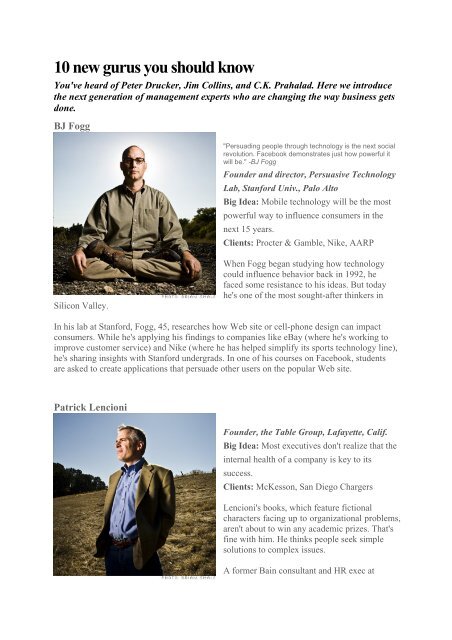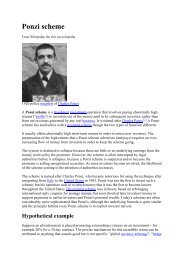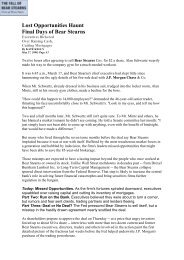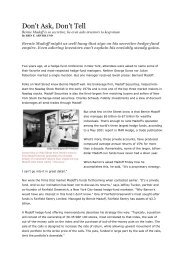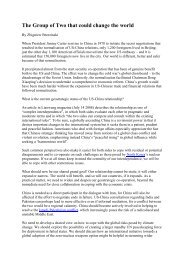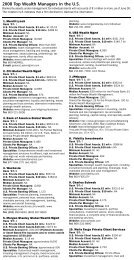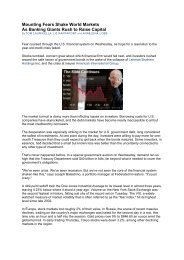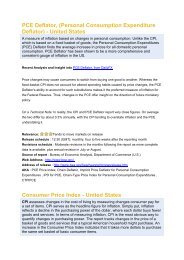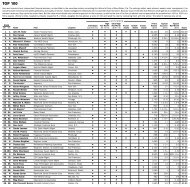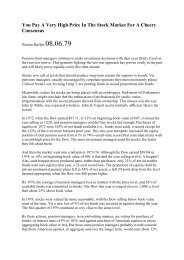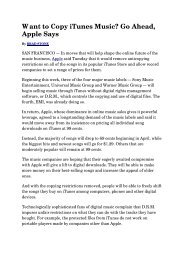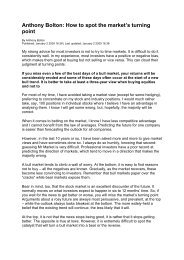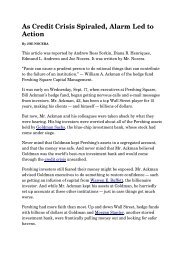10 new gurus you should know - Morningbull
10 new gurus you should know - Morningbull
10 new gurus you should know - Morningbull
Create successful ePaper yourself
Turn your PDF publications into a flip-book with our unique Google optimized e-Paper software.
<strong>10</strong> <strong>new</strong> <strong>gurus</strong> <strong>you</strong> <strong>should</strong> <strong>know</strong><br />
You've heard of Peter Drucker, Jim Collins, and C.K. Prahalad. Here we introduce<br />
the next generation of management experts who are changing the way business gets<br />
done.<br />
BJ Fogg<br />
Silicon Valley.<br />
"Persuading people through technology is the next social<br />
revolution. Facebook demonstrates just how powerful it<br />
will be." -BJ Fogg<br />
Founder and director, Persuasive Technology<br />
Lab, Stanford Univ., Palo Alto<br />
Big Idea: Mobile technology will be the most<br />
powerful way to influence consumers in the<br />
next 15 years.<br />
Clients: Procter & Gamble, Nike, AARP<br />
When Fogg began studying how technology<br />
could influence behavior back in 1992, he<br />
faced some resistance to his ideas. But today<br />
he's one of the most sought-after thinkers in<br />
In his lab at Stanford, Fogg, 45, researches how Web site or cell-phone design can impact<br />
consumers. While he's applying his findings to companies like eBay (where he's working to<br />
improve customer service) and Nike (where he has helped simplify its sports technology line),<br />
he's sharing insights with Stanford undergrads. In one of his courses on Facebook, students<br />
are asked to create applications that persuade other users on the popular Web site.<br />
Patrick Lencioni<br />
Founder, the Table Group, Lafayette, Calif.<br />
Big Idea: Most executives don't realize that the<br />
internal health of a company is key to its<br />
success.<br />
Clients: McKesson, San Diego Chargers<br />
Lencioni's books, which feature fictional<br />
characters facing up to organizational problems,<br />
aren't about to win any academic prizes. That's<br />
fine with him. He thinks people seek simple<br />
solutions to complex issues.<br />
A former Bain consultant and HR exec at
Oracle, Lencioni, 43, started his business in 1997 because his felt most consultants ignored<br />
organizational health. His eight books, including The Five Dysfunctions of a Team and Death<br />
by Meeting, have sold a combined 2.5 million copies, and Lencioni earns $55,000 a speech.<br />
At Southwest Airlines he was the first outsider to work with the executive team in 12 years. In<br />
his latest work he turns to overwhelmed families - who, he says, need the same kind of help<br />
his clients do.<br />
Rakesh Khurana<br />
Professor of business administration, Harvard<br />
Business School, Cambridge, Mass.<br />
Big Idea: Charismatic CEOs don't work;<br />
management needs to become a profession, like<br />
law.<br />
Clients: IBM, Tyson Foods, American Family<br />
Do business leaders have a responsibility<br />
beyond earning profits? Absolutely, says<br />
Khurana, who thinks the management <strong>should</strong><br />
be a profession with licensing tests, a code of<br />
ethics à la law or medicine, and a stated<br />
commitment to improving the well-being of<br />
shareholders and society. Despite his scathing<br />
condemnation of business school education, the 41-year-old was awarded tenure at Harvard.<br />
Khurana has consulted for several companies about leadership, and he's cautioned against<br />
what he calls the "irrational search for charismatic CEOs," a misguided belief that a CEO with<br />
a magnetic personality translates to corporate success (it doesn't).<br />
Valerie Casey<br />
"I'm trying to make sure that sustainability is not just a line<br />
item." -Valerie Casey<br />
Leader, Digital Experiences Practice, IDEO;<br />
founder, the Designers Accord, Palo Alto<br />
Big Idea: A Kyoto Protocol for designers<br />
Clients: AT&T, Samsung, Dell, Virgin<br />
Inside design powerhouse IDEO, where she's<br />
working on next-generation mobile products<br />
for AT&T, Casey is the expert on all things<br />
digital. But around the world she's fast<br />
becoming a leader of the green-design<br />
movement. Two years ago she decided to act
on her realization that a beautiful keyboard or mobile phone is still an object that creates<br />
waste.<br />
To get designers - and their clients - to think about sustainability before, not after, they create,<br />
Casey, 36, wrote the Designers Accord, a set of guidelines that commits its signatories to<br />
support sustainable design and requires them to track their own carbon footprint. It struck a<br />
chord: More than <strong>10</strong>0,000 people and organizations - including Johnson & Johnson Consumer<br />
Products, and Autodesk - have signed on.<br />
Don Sull<br />
Professor of management practice in strategic<br />
and international management, London<br />
Business School<br />
Big Idea: Welcome uncertainty in turbulent<br />
times.<br />
Clients: Nokia, Mars, Baker & McKenzie<br />
Sull didn't start off with ivory-tower aspirations.<br />
After four years at McKinsey and private<br />
equity firm Clayton Dubilier & Rice, he was<br />
drawn to academic life as he kept observing<br />
companies practicing "active inertia," or<br />
dealing with current problems "by accelerating<br />
activities that had worked in the past."<br />
Sull, 45, now has <strong>new</strong> solutions for companies. One is to forget entirely about a grand vision,<br />
which locks them into vague promises or could commit them to a doomed strategy. The other<br />
is to embrace uncertainty, which he addresses in his upcoming book, "The Upside of<br />
Turbulence." The takeaway: Companies still need a map, but it needs to be focused on a few<br />
must-win battles and be fluid enough to be redrawn in the case of sudden shocks.<br />
Joel Podolny<br />
Former dean, Yale School of Management;<br />
incoming vice president and dean, Apple<br />
University, Cupertino, Calif.<br />
Big Idea: Business schools must teach real-life<br />
problem solving.<br />
Clients: BP, General Mills, Royal Bank of<br />
Scotland<br />
If the current state of affairs is any indication,
we haven't done a very good job training our business leaders. But there's a <strong>new</strong> model,<br />
thanks to Podolny, 43, who took over at Yale in 2005 and quickly overhauled the curriculum.<br />
Gone from the core are courses like finance; in their place are courses on the customer and the<br />
investor, which look at problems holistically. Now in its third year, the program has already<br />
gained attention from other schools and companies.<br />
If anyone needed validation about Podolny's creativity, they got it when he announced in late<br />
October that he was leaving Yale for Apple, where he'll be building Apple University, the<br />
company's first formal training and leadership program.<br />
Nouriel Roubini<br />
"I am not going to say I told <strong>you</strong> so, but I did."-<br />
Nouriel Roubini<br />
Professor of economics, NYU Stern<br />
School of Business, New York City<br />
Big Idea: Create a <strong>new</strong> global regulatory<br />
framework.<br />
Clients: IMF, U.S. Treasury, World Bank<br />
They don't call him "Dr. Doom" for<br />
nothing. The Turkish-born, Italianeducated<br />
Roubini, 50, was the solitary<br />
voice back in 2006 when he warned that the U.S. current account deficit, the housing bubble,<br />
the rising price of oil, and "excessively easy money combined with a lack of supervision"<br />
created a toxic mix that could cause a violent recession - if not the reordering of the world's<br />
financial system.<br />
He was early, but he was absolutely right. "I'm not going to say I told <strong>you</strong> so," he says, "but I<br />
did." Roubini, who also runs a macroeconomic Web site, RGE Monitor, sees at least a year of<br />
trouble ahead. "The short-run risk of a total financial meltdown has been reduced," but "the<br />
recession train has left the station."<br />
Janine Benyus<br />
"We are creating a way for biological ideas to get into<br />
human designs."-Janine Benyus<br />
Co-founder, Biomimicry Guild and Institute,<br />
Helena, Mont.<br />
Big Idea: Innovate by imitating, or<br />
"mimicking" nature.<br />
Clients: Boeing, GE, Herman Miller, Kraft<br />
Foods
After Benyus published her 1997 book, "Biomimicry," businesses in search of sustainable<br />
practices started calling. The 50-year-old biologist - whose breakthrough concept is to apply<br />
nature's best solutions to modern-day problems - now helps organizations invent eco-friendly<br />
products and processes.<br />
For Nike, it resulted in the creation of a swimsuit based on shark's skin. To help a $1 billion<br />
carpet-tile manufacturer reduce waste, Benyus's team turned to the forest floor for inspiration<br />
and designed a line of tiles inspired by the randomness of fallen leaves. They also studied<br />
geckos and beetles to find a better form of adhesive products.<br />
Up next? Her institute is partnering with architectural powerhouse HOK to design<br />
international building projects that imitate ecosystems.<br />
Dan Ariely<br />
"People often and repeatedly make illogical yet<br />
predictable decisions." - Dan Ariely<br />
Professor of behavioral economics, Duke<br />
University; member of MIT's Media Lab<br />
Center for Future Banking<br />
Big Idea: People are predictably irrational<br />
Clients: Bank of America, Match.com, P&G<br />
While serving in the Israeli army, Ariely<br />
suffered third-degree burns. Throughout his<br />
recovery, he found himself constantly<br />
questioning his doctors' decisions, specifically<br />
the process of alleviating pain.<br />
His curiosity about human behavior led to two Ph.D.s, and now he uses his research to advise<br />
companies on how to influence consumer decision-making. He's helped a large insurer reduce<br />
cheating on its' claim forms, and he's helping create a toothbrush for Procter & Gamble that<br />
reminds people to take their prescription medication. Ariely, 41, also studies the logic behind<br />
spending patterns - what consumers are willing to spend on a product vs. their understanding<br />
of its value. And that will make him a very popular man in this economy.<br />
Niko Canner<br />
Co-founder, managing partner, Katzenbach<br />
Partners<br />
Big Idea: Companies tend to avoid change, or<br />
change at the expense of their core strengths.<br />
Clients: T-Mobile, MasterCard, Pfizer
Canner, 37, has emerged in recent years as one of the brightest lights in both strategy and<br />
organizational issues. Known for getting to the root of incredibly complex problems, he works<br />
with CEOs and top executives to help them make huge strategic shifts without destroying the<br />
existing culture.<br />
He's helped T-Mobile reorient itself as a consumer company rather than a wireless one. He's<br />
also worked to globalize Korean conglomerate Doosan Group and developed nonprofit<br />
Acumen Fund's elite Fellows program. Now Canner and his team are focused on their own<br />
long-term project: China 2024, a study that's following 114 <strong>new</strong> Chinese MBAs for 20 years<br />
to learn firsthand lessons about China's business evolution.


